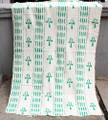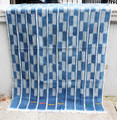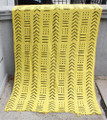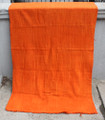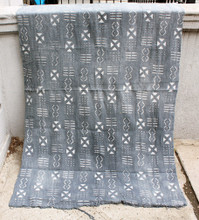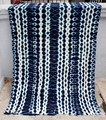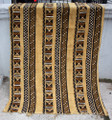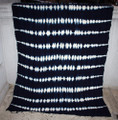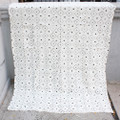 Loading... Please wait...
Loading... Please wait...- Home
- African Textiles & Scarves
- Mali Mud Cloth
- Mali Mud Cloth 383 J
Product Description
" Handwoven cloth is sometimes regarded as having a spiritual potential not found in manufactured fabric."
Bogolan cloth once despised as rural non-Islamic, peasants cloth has transformed into a symbol of national identity for Mali. The creation of most Bogolan cloth begins in the Beledougou Bamana area north of Bamako. The manufacture of this cloth is a long painstaking, laborious, process. It is woven by men on the local version of the narrow strip loom. First raw materials are hand processed and woven into plain white cloth strips about 12 centimeters wide. Next comes the dying, which is primarily a womans craft passed from mother to daughter. After the cloth is washed and allowed to shrink while drying, it is then soaked in a brown solution made from pounded Bougalan tree leaves and other ingredients made by specialists. The cloth takes on an even yellow color that is ready for the application of mud dye designs. The mud that is used is collected from the deepest sections of the ponds. The mud is left to ferment in a covered pot for about a year. During this time it turns black in color. The potted mud is diluted with water when needed. The designs are drawn on the cloth section by using various width spatulas made of small pieces of Bamboo and flat metal. The main larger sections are marked off while lying flat on the ground. The smaller more detailed work is done on a womans lap with the section placed over a calabash. The entire process of washing, dipping in the leaf solution and painting with the mud dye is repeated after which a solution that includes caustic soda is applied to the yellow areas. These areas are exposed to intense sunlight for a week until the desired whiteness is reached. The amazing aspect of Bogolanfini or mud cloth is that the background is actually applied and not the lightened areas. Some Bogolan cloth because of the demands of the tourist trade is hastily produced. Stencils, simplified designs and chemicals are used to speed up the long process. In normal practice the designs, patterns and motifs have clearly defined names or meanings. Traditionally certain patterns were used to protect women from hostile spiritual forces during transition into adulthood. Other motifs protected women from harm when confronting and killing powerful animals.
A uniquely gray mud cloth decorated with natural tribal white patterns.
Please click photo enlargement!
Dimensions: 64 inches long x 42 inches across
Any QUESTIONS please leave a message here at Contact Us!
*Fixed or free shipping for domestic orders only*
.



